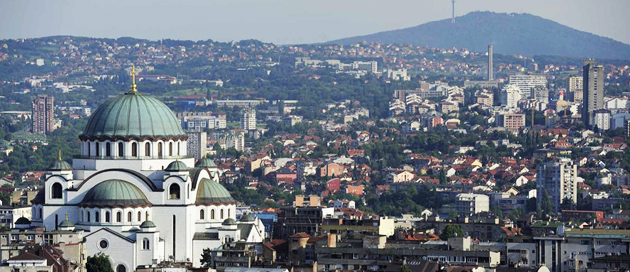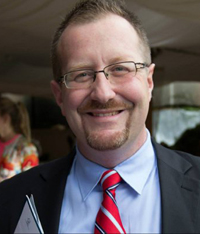Serbian evangelicals gain visibility but are still “regarded with suspicion”
About 10,000 believers seek to serve a society that looks to Europe for answers to the financial crisis. An interview with Samuil Petrovski.
BELGRADE · 28 SEPTEMBER 2015 · 14:24 CET

Serbia’s 7 million inhabitants are “joyful people” with a growing European identity. There are about 10,000 evangelical Christians in a society where religion does not seem to be among the people’s priorities.
Samuil Petrovski, a Serbian evangelical leader who knows the country well, talked to Evangelical Focus to give some insights about the social and spiritual atmosphere.
Petrovski serves as Secretary General of IFES Serbia and as President of the Serbian Evangelical Alliance. He and sees the need for the churches to unite and train young people who will be able to connect the gospel with the environment in which they live in.
3 IDEAS TO DESCRIBE THE SERBIAN SOCIETY

“Weddings, birthdays, the birth of a new baby, a new job – these are all causes for extensive and extravagant celebrations with music, dancing, drinking, and lots of meat!”.
Right now, Serbs are “at a crossroads”. The country is an official candidate of the European Union, and the people “see themselves as European”. “Low cost airlines have made Western capitals more accessible, and most young people have a good knowledge of the English language. Yet at the same time Serbia wants to maintain close ties to ‘brother Russia’”.
Another reality that marksthe identity of Serbia is the financial situation. “There is very high unemployment in the country right now, and many young people cannot find jobs”.
“This makes them less invested in their studies and less invested in the future of their country, as they are eager to move to the West where they can earn a fair wage”, says Petrovski.
“FAITH DOES NOT PLAY A ROLE IN MOST PEOPLE’S LIFES”
Looking at the spiritual landscape, one can conclude that the Orthodox Church is not engaging with the reality of the people’s profound needs.
“After many years of communism, Serbia returned to its traditional Orthodox Christian faith. The vast majority of Serbs would identify themselves as Orthodox. However for the most part their faith is nominal and does not play a big role in their lives. Many people have never read the Bible and don’t understand the concept of a personal relationship with God”.
People only attend some religious services “a few times a year” for Christmas, Easter, and weddings. And “most families choose a family saint and will host a party on that saint’s day (called a ‘Slava’), however when asked, few of them know much more about their chosen saint than his name”.
“Those that are more serious about their faith tend to have a very works-based faith, with little concept of grace”.
In this spiritual context, evangelical churches have experienced “some ‘slow growth’” in recent years, “however the trend is tending towards stagnation”, thinks Petrovski.
“There are about 10,000 evangelical believers in the country, though that is an optimistic estimate. Evangelical churches are very small and not very unified, although we are working on that now”.
The greatest growth has been seen “in Roma churches [gypsies] and among former drug addicts”.
ATTACKS IN THE MEDIA
As it happens in other countries were there has been little Protestant history, Serbian evanelicals have suffered discrimination for many years.
“In the ‘90s there were big attacks on evangelicals, portraying us as a sect. The presence of the evangelical church was seen as a result of negative influence from the United States”, Petrovski recalls.
“Currently society still sees evangelicals as a sect and regards us with suspicion. Part of the reason for this is ignorance, and a reason for this ignorance is that evangelical leaders and pastors isolated themselves instead of working together to create an accurate and positive picture of Evangelicals in society”, says Petrovski.
“In the last few years we have organized events which have helped us promote evangelical Christianity in the media. The highest profile event was a visit by Nick Vujicic, which opened doors and helped us build good relationships with the media, government institutions, and secular NGOs. We have also organized some charity events which opened doors for better representation of evangelicals in society”.
These efforts have led in some cases to positive outcomes. “In recent months a newspaper published an article attacking evangelicals and describing them as a cult”. The Evangelical Alliance complained to the government agency which protects the right to free speech, and “the agency contacted the newspaper, urging them to retract the article and write a few positive articles about us. The newspaper did so and now we have a good relationship with that publication”.
MODERN-DAY ‘DANIELS’
Are Christian believers connecting their faith to the society they live in, making an impact for good where they live and work?
“For the most part Christians in Serbia understand the need to serve in all areas of society – Christians serve in orphanages, run camps for children with special needs, work with drug addicts, etc”, analyses Petrovski.
But at the same time, “most churches do not see their members as ‘modern-day Daniels’ whose task is to influence society, but instead are more interested in them attending church services”.
“One of the main goals of the International Fellowship of Evangelical Students in Serbia is to train these ‘modern-day Daniels.’ We aim to educate students to be salt and light in society, to be people of integrity working in every sphere of society to the glory of God”.
THE BALKAN WAR… AND THE REFUGEE CRISIS NOW
Serbia has been one of the Eastern European countries with more refugees arriving to their borders. How has this all been seen in the country?
“Many Serbian people have given sacrificially of their time and resources to help as volunteers”. Evangelical churches “have been active in volunteering and assisting refugees. In the International Christian Fellowship in Belgrade there are members that work for NGOs that are responding to the crisis, and they have gotten church members involved”.
“Although a majority of evangelicals have responded compassionately to the crisis, seeing it as an opportunity to show Christ’s love to those in need, there is also a minority who has responded in fear, claiming that these refugees will Islamize Europe, and saying that the focus of Christians should be on the poor in Serbia”.
The recent history of the country is key to understand the refugee crisis now, Petrovski concludes. “Serbia has about 800,000 refugees from the Balkan wars, so the Serbian people are generally compassionate towards refugees – my wife is a refugee!”
ABOUT SAMUIL PETROVSKI
Samuil Petrovski lives in Belgrade, Serbia, where he serves as the General Secretary of the International Fellowship of Evangelical Students for Serbia, and as the President of the Serbian Evangelical Alliance. He is also a member of the board of the International Christian Fellowship in Belgrade and one of the leaders of Koinonia Christian Fellowship. He studied economics at Belgrade Business School and has a Master’s in Leadership from Singidunum University in Belgrade. Samuil is also a member of the organizational committee for the Balkan Prayer Breakfast, through which he builds relationships with politicians from the region, sharing the Gospel with them and encouraging them in their faith. He has a wife, Nada, and a daughter Lara (age 8) and a son Filip (age 2).
Published in: Evangelical Focus - europe - Serbian evangelicals gain visibility but are still “regarded with suspicion”
